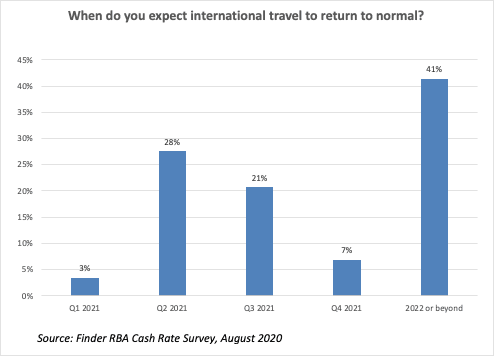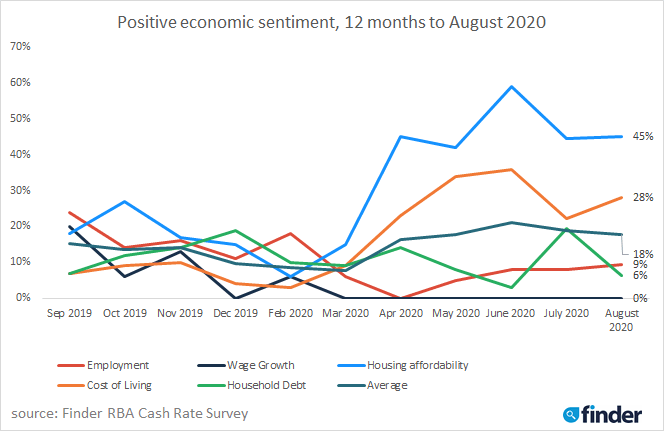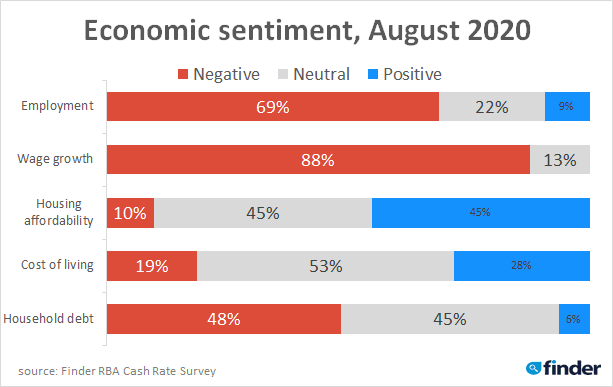- Bessie Hassan
- Head of PR & Money Expert
- finder.com.au
- +61 402 567 568
- Bessie.Hassan@finder.com.au
Media Release
RBA survey: Experts say Australian economy is yet to “turn a corner”
- 58% of experts disagree with RBA governor that Australia's economy is improving
- 97% don't expect international travel to return to normal for at least 9 months
- All experts accurately predicted the cash rate to remain at 0.25% this month
4 August 2020, Sydney, Australia – Although June labour force figures revealed a slight employment uptick, the nation is yet to reach an economic turning point according to Finder, Australia's most visited comparison site.
In this month's Finder RBA Cash Rate Survey™ – the largest of its kind in Australia – 40 experts and economists weighed in on future cash rate moves and other issues related to the state of the Australian economy.
While all experts and economists surveyed correctly predicted the cash rate to hold at 0.25% (40/40), the majority of those who weighed in on Australia's economy don't believe it is improving just yet.
In late July, RBA Governor Phillip Lowe announced that Australia's economy had "turned a corner" after June ABS figures revealed that the number of employed people rose by 210,000.
Despite this, more than half (15/26, 58%) of the surveyed experts disagree with Lowe's statement, saying that the total economic impact is impossible to forecast with a second outbreak unfolding across Victoria and NSW.
Graham Cooke, insights manager at Finder, said that Australia's economic fate rests on how well authorities can limit the spread of the virus.
"The virus situation has rapidly deteriorated since June.
"As Melbourne enters a Stage 4 lockdown, businesses are once again bracing for restrictions and closures that will no doubt send economic shock waves across the country.
"Masks are now mandatory in Melbourne, and we're seeing more people covering their faces throughout Sydney," he said.
Rebecca Cassells of Bankwest Curtin Economics Centre said that the recent surge in infections is threatening retail recovery.
"Thousands of jobs were recovered in June, retail sales improved and business and consumer confidence was up. But virus outbreaks in Victoria and NSW have very rapidly undone this trajectory.
"JobKeeper and JobSeeker offer some economic certainty, but getting the virus back under control will offer more," she said.
When it comes to JobKeeper, only half of the experts (14, 50%) agree with the recent JobKeeper changes that were announced just over a week ago.
One-third (9, 32%) of respondents claimed that payments should have been expanded in some way while almost one-fifth (6, 18%) say that it should have been reduced by either the value received or eligibility.
"With JobKeeper's extension, the government was able to please half of the experts and annoy the other half in nearly equal and opposite ways.
"If a good compromise is when both parties are dissatisfied, I think that's what we have with JobKeeper," Cooke said.
International travel off the cards until mid-2021 at the earliest
When asked about when international travel will return to normal, almost all the experts (97%, 28/29) stated they do not expect this to happen until April of next year.
Around 28% (8/29) believe that international tourism will return by Q2 2021, with that same number expecting it by the second half of next year.
Around 41% (12/29) say we may be waiting until 2022 or beyond before things return to normal.

Cooke said that extended travel bans are a concern for those with frequent flyer or velocity points.
"If you've been saving those frequent flyer points for a nice round-the-world trip, you may be out of luck for many months, or years, to come.
"There is also a good chance, once flights do resume, that points will be worth less than they are today," he said.
Economic sentiment tracker
Finder's Economic Sentiment Tracker gauges experts' confidence in five key indicators: housing affordability, employment, wage growth, cost of living and household debt.
While overall positive economic sentiment has increased dramatically since March, there was a slight decline of 18% across all four metrics this month, after reaching a high of 21% in June.

Surprisingly, two-thirds of the surveyed experts (20, 65%) believe that Australia will see GDP growth in 2020, despite the Treasurer confirming in June that the nation is now in recession.
Cooke said this optimism was largely unexpected.
"This is a shocking result. Seeing two-in-three economists say we will exit recession this year certainly swims against the general tone of economic news right now.
"With the number of cases shooting up in Victoria since the survey closed, and more cases becoming apparent in NSW and Queensland, our expert panel may be being a tad optimistic," he said.
Experts remain overwhelmingly negative about wage growth (88%) and employment (69%); however, there was a slight improvement in positive sentiment around cost of living, which increased to 28% from 22% in July.

Here's what our experts had to say:
Nicholas Frappell, ABC Bullion: "[There is] uncertainty around the timing of the recovery both within and without Australia, and the likelihood that the economic impact will extend well into 2021."
Shane Oliver, AMP Capital: "Having provided massive monetary stimulus back in March, the RBA is still in "watch and wait" mode, with the focus on fiscal policy. It could still ease monetary policy a bit further later this year but the Bank does not see any value in going negative on rates; cutting to say 0.1% is hardly worth the effort (although it's possible) which leaves more QE as the main tool for any further easing. And rate hikes are still at least three years away."
Alison Booth, ANU: "It's unlikely there'll be a change in the near future."
John Hewson, ANU: "[This is the] deepest economic contraction since the Great Depression."
Malcolm Wood, Baillieu: "RBA forward guidance – no change until significant progress toward full employment and inflation sustainably 2-3% year-on-year."
Rebecca Cassells, Bankwest Curtin Economics Centre: "It will be some time before the RBA starts to signal that they are contemplating an increase in the cash rate. The prospect of a strong and swift recovery was evident in June, with a number of headline indicators forming healthy V's. Thousands of jobs had been recovered in June, retail sales had recovered and business and consumer confidence was up. But virus outbreaks in Victoria and NSW have very rapidly undone this trajectory – particularly for Victoria. The commitment by the government to extend JobKeeper and JobSeeker offers some certainty, but getting the virus back under control will offer more. We only have to look to Western Australia to see how quickly an economy and labour market can bounce back when the virus is contained and business and activity restrictions minimal."
David Robertson, Bendigo and Adelaide Bank: "The RBA still appear to have no appetite for negative interest rates, although a cut from 0.25 to 0.10 is possible. Most likely rates are on hold for two or more years, before very gradually rising."
Sarah Hunter, BIS Oxford Economics: "As with last month, we don't see the cash rate rising until the second half of 2023 at the earliest."
Sean Langcake, BIS Oxford Economics: "We expect the cash rate target will be on hold through to 2023. The board will want to ensure the recovery is on sure footing before increasing rates, and inflation will likely undershoot the target for some time yet. The next move will be up – the Bank has shown they have no desire to take rates into negative territory."
Ben Udy, Capital Economics: "We expect the RBA to launch fresh quantitative easing next year as it becomes clear inflation will be weaker than the Bank expects."
Peter Boehm, CLSA Premium: "Interest rate movements will do little to address present and ongoing economic challenges Australia faces as a result of the global pandemic. In economic or financial terms, the key focus must now be on Government Fiscal Policy, and in particular, the ongoing levels of financial support needed to save and support the economy."
Saul Eslake, Corinna Economic Advisory: "I think it's quite possible that the RBA won't raise the cash rate until 2023."
John Rolfe, Elders Home Loans: "I believe the RBA will not reduce cash rate any further and as the economy improves, will be keen to increase back toward 2%."
Craig Emerson, Emerson Economics: "We're in a world of deflation and unemployment, which will persist for the foreseeable future."
Angela Jackson, Equity Economics: "RBA will hold interest rates for the foreseeable future with the outlook for the recovery very uncertain."
Mark Brimble, Griffith University: "With little further room to move and impact to be gained, the RBA will want to keep the last traditional MP action in reserve for any further major deterioration. It will also want to see the impact of other stimulus and support measures being deployed by the government."
Tony Makin, Griffith University: "COVID-19 continues to create gross economic uncertainty, domestically and globally. However, given the large ongoing bond issues by federal and state governments to fund huge budget deficits due to responses to contain the virus's spread, market interest rates should continue to rise, with the 3-year bond rate already above the RBA's target 0.25%. The dollar has appreciated some 25% March-July reflecting capital inflow chasing Australia's AAA-rated bonds and could keep climbing as happened post-GFC, to the detriment of industries in the tradable sector of the economy, making economic recovery that much harder."
Stephen Miller, GSFM: "I think the policy rate will be unchanged between now and the end of 2022."
Leanne Pilkington, Laing+Simmons: "The outlook for the unemployment rate sent shivers up spines recently and should see rates remain steady and low for the foreseeable future, as attention turns to the Government's efforts to stimulate the economy."
Nicholas Gruen, Lateral Economics: "It's a wild guess. The RBA should reduce rates, including going negative. Not that it will make much difference, but it has said it won't. At some stage, it will increase them but it will be a long while coming."
Mathew Tiller, LJ Hooker: "The RBA has flagged that the cash rate will remain on hold until economic conditions are more positive and certain. Property markets have been one beneficiary of low-interest rates over recent months with LJ Hooker agents, across the country, reporting elevated levels of enquiry and solid attendance numbers at auctions and open homes."
Geoffrey Kingston, Macquarie University: "Inflationary pressure from the sustained expansionary policy should be manifesting itself around this time."
Jeffrey Sheen, Macquarie University: "Forward guidance by the RBA indicates that the cash rate will remain unchanged for at least three years."
John Caelli, ME Bank: "The RBA will continue to keep rates where they are until there is a material improvement in repairing the economic damage done by COVID-19. Unemployment is likely to stay well above their targets for a long time."
Michael Yardney, Metropole Property Strategists: "The RBA has indicated that they will not change interest rates in the foreseeable future. They are not going to move to negative interest rates, and they will not raise interest rates until the unemployment rate is 4.5%. That won't happen for a number of years."
Mark Crosby, Monash University: "No way to know when the RBA will consider any change to rates until COVID-19 is behind us. Doubtful that they will reduce rates given that a rate reduction would not have much impact."
Julia Newbould, Money magazine: "All depends on what happens when the next stimulus package kicks in and what happens as companies start having to report more regular income changes."
Susan Mitchell, Mortgage Choice: "There is very little evidence to suggest that the RBA will change the cash rate at its August meeting. In a speech delivered on the 21st of July, Governor Lowe reaffirmed the Reserve Bank board's strategy outlined in its March package and ruled out the possibility of negative interest rates in Australia. In the meantime, borrowers can continue to access an extremely competitive home loan interest rate environment."
Alan Oster, NAB: "[A rate change is a] long long time away, possibly beyond 2023, but very unlikely to cut."
Jonathan Chancellor, Property Observer: "Despite their stated intention not to go lower, the patchiness of the economy will see the RBA cut."
Rich Harvey, Propertybuyer: "[The] COVID crisis is causing unprecedented impact and [the] RBA must do all it can to stimulate investment and growth."
Noel Whittaker, QUT: "[The] future is still just so uncertain."
Cameron Kusher, REA Group: "The RBA has set themselves a number of targets that are required in order for them to lift the cash rate; they have also highlighted they think that will take around three years. Nothing that we are seeing at the moment makes me feel as if interest rate cuts are likely, nor do I think we will be getting hikes in the near future."
Jason Azzopardi, Resimac: "RBA commentary to the market rates will remain steady indefinitely."
Christine Williams, Smarter Property Investing: "We are in a very uncertain economic environment with COVID-19."
Other participants: Alex Joiner, IFM Investors; Andrew Wilson, My Housing Market; Janu Chan, StGeorge; Brian Parker, Sunsuper; and Bill Evans, Westpac.
###
For further information
- Bessie Hassan
- Head of PR & Money Expert
- finder.com.au
- +61 402 567 568
- Bessie.Hassan@finder.com.au
Disclaimer
The information in this release is accurate as of the date published, but rates, fees and other product features may have changed. Please see updated product information on finder.com.au's review pages for the current correct values.
About Finder
Every month 2.6 million unique visitors turn to Finder to save money and time, and to make important life choices. We compare virtually everything from credit cards, phone plans, health insurance, travel deals and much more.
Our free service is 100% independently-owned by three Australians: Fred Schebesta, Frank Restuccia and Jeremy Cabral. Since launching in 2006, Finder has helped Aussies find what they need from 1,800+ brands across 100+ categories.
We continue to expand and launch around the globe, and now have offices in Australia, the United States, the United Kingdom, Canada, Poland and the Philippines. For further information visit www.finder.com.au.
12.6 million average unique monthly audience (June- September 2019), Nielsen Digital Panel